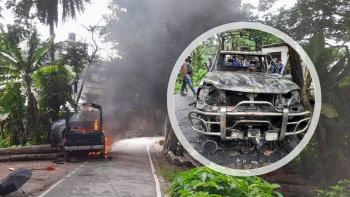Forgive us, Alvira

I have never met you, my child. But, there are so many of you we all know; cheerfully running around, full of life, the apple of your parents' eyes. And your grandparents? They must love you to bits.
Whereas the world should have been your playfield, your workshop to discover anew, your garden to dwell in peace and tranquillity, we have turned it into an ordeal where danger lurks abundantly, and death strikes with cruelty. We beg you an apology.
You did not know that Thursday evening (March 29) at the Green Peace Apartment Complex at Shantinagar—as you got ready joyfully to celebrate your mother's birthday—manmade machinery would stand in your way. Designed to be a safe threshold, the lift doorway turned out to be a passage from life unto death. We have no words of consolation.
As you tried to follow your parents into the lift car, the sensors failed to detect your presence, and the doors not only trapped your hand and leg but the lift began to move. We have no explanation. Such "accidents" are no less than murder because there are people involved in the making, installation, operation, and maintenance of the lift.
As it happens after every tragedy involving a building in this country, a witch-hunt is on, which for your 10 years is difficult to understand. There is the question of lift maintenance, and your neighbours claim that all six in your building were dysfunctional for a long time. They say they raised the issue and pleaded for safety but the building authority (?) lent a deaf ear. The authority too is raising hue and cry, but only after your departure. We always wait that much long.
Apartment residents are after the building management, formed of property owners and tenants, which is responsible for maintaining the premises, including its lifts, in reasonably safe condition. Some are after the liftmen. What would a liftman do if indeed the lift doors had shut forcefully in his presence? He may have become a hero saving you, or he too may have been badly hurt.
Lawyers speaking to journalists said there was no legal option other than seeking damages. We don't have to agree. Almost no one is considering that the lift itself may have been the problem; that it was faulty as made or as installed.
We need to know for the sake of future generations, for Alviras that shall be using lifts in our cities, the name of the maker, the brand and the model of the lift, the local installing company, and its expertise and experience, individually and at corporate level. Where was it manufactured? In which year? By now we should have known the entities involved and possibly liable. We are shy to name names when self-interest overrules. But, why over your dead body?
As a remediation measure, the local supplier and installation company should commence checking each and every lift they have imported, supplied and installed in the country. This is an opportunity to prevent repetition of such a gruesome incident.
The manufacturing company of the lift, which most likely is resident in a foreign country, should inspect safety issues of its product in Bangladesh and across the globe. Has the company considered recalling the lifts of the same model?
After nearly one hundred incidents of Galaxy Note 7 overheating, resulting in fires and explosions, and sometimes injuring owners, in September 2016, Samsung voluntarily suspended sales of the device and announced an informal recall. That's common sense.
Sedan manufacturer Tesla, of their own accord, recalled 123,000 vehicles around the world, built before April 2016, to fix a problem with the vehicles' power steering. That's nearly half of the cars Tesla has put on the road in the company's history. "There have been no injuries or accidents due to this component," Tesla's email sent to customers read. That's shouldering responsibility.
Fatal lift accidents of the type Alvira met are rare worldwide, but they happen. In June 2006, 16-year-old Hirosuke Ichikawa of Tokyo was caught halfway out of the elevator along with his bicycle when it suddenly shot upwards, with the doors fully open, pinning him against the door frame, and killing him. The resulting investigation brought into question the safety of lifts in all of Japan, especially those manufactured by Swiss elevator company Schindler. The inquiry found 41 elevator-related mechanical problems in two Schindler elevators installed in the apartment complex. The braking system in the elevator had failed, combined with poor maintenance. The Minato Ward public housing corporation decided to replace all five Schindler elevators in the condominium.
Bangladesh is also poor in statistics, which is vital for planning any strategy, including for safety. We have no idea about the numbers here—the injured and the dead are almost never reported or listed.
For instance, the nearly one million elevators in the US make over 18 billion trips per year, each one carrying an average of five people per trip. Although elevators are generally safe, accidents do happen. Annually, in the States, over 10,000 people are injured in an elevator accident and approximately 30 are killed.
Most deaths result from falling into the elevator shaft. Other causes include being caught between the elevator car and the wall of the elevator shaft, getting caught within the elevator's moving parts, sudden lurches, stops and/or landings, doors failing to open or open sufficiently, and power failures.
We are extremely careless about safety issues and assume mishaps to be inevitable. We have the notion that "what will happen will." We are terrible at taking precautionary measures and regular inspections.
Crosschecking: the morning after Alvira met with her misfortune, how many building occupants and owners, and lift manufacturers and installers have checked to ensure the safety of their lifts (owned/manufactured/installed)? An educated guess would be "none".
Safety checks and necessary repairs should be done every few months, not after every Alvira screams in pain, bleeds to death, and numbs her parents for life. Inspections can save lives. It is not a waste of time. It is mandatory.
We hope we never have to meet another you. Forgive us, Alvira.
Dr Nizamuddin Ahmed is a practising architect, a Commonwealth Scholar and a Fellow, a Baden-Powell Fellow Scout Leader, and a Major Donor Rotarian.





Comments